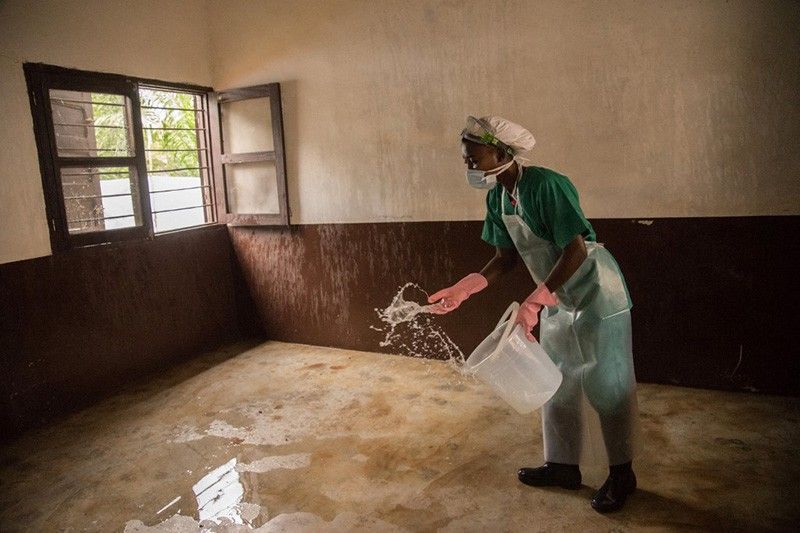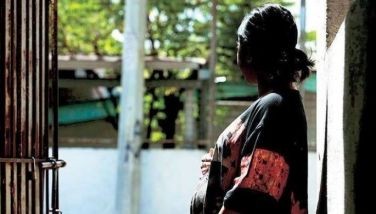mpox

The health ministry says Argentina registered its first death from mpox, the disease formerly known as monkeypox, when a patient died in a hospital in the capital Buenos Aires.
The fatality was a 44-year-old man who was diagnosed with untreated HIV-AIDS and suffered septic shock, which caused his death, the health ministry says.
The patient had been hospitalized since mid-September in intensive care with respiratory assistance and his death was registered on November 22, the report adds. — AFP
An Italian tourist with monkeypox, the first reported case in Cuba, has died, the country's health ministry announced on Monday.
"This patient rapidly deteriorated to critical condition, having been unstable since August 18, dying on the afternoon of the 21st," the ministry said in a statement.
The 50-year-old arrived in Cuba on August 15 and was hospitalized three days later, the statement said.
"The autopsy carried out at the Institute of Forensic Medicine showed that the cause of death was sepsis due to bronchopneumonia caused by an unspecified germ and multiple organ damage," it added.
The ministry ruled out the patient having other pathologies of infectious origin, after carrying out studies seeking explanations for the severity of his case. -- AFP
Cuba reported its first case of monkeypox Saturday in an Italian tourist who is in "critical" condition, the health ministry said.
The patient, who arrived in Cuba Monday and was hospitalized three days later, "is in critical condition with his life in danger," the health ministry said in a note broadcasted by National Television News.
After feeling unwell Wednesday, the patient's health worsened and by Thursday he was transferred to the hospital for "intensive treatment, arriving in cardiac arrest from which he recovered." -- AFP
Whether it's abstinence, avoiding nightclubs, limiting sexual partners or pushing for a swift vaccine rollout, Spain's gay community are on the front line of the monkeypox virus and are taking action.
"With this monkey thing, I prefer to be careful... I don't have sex any more, I don't go to parties any more, and that's until I'm vaccinated and have some immunity," said Antonio, a 35-year-old from Madrid who declined to give his surname.
Antonio, who often went to nightclubs and sometimes to sex parties, decided to act as cases continued to increase.
Spain on Saturday reported its second monkeypox-related death.
Outside of Africa, the only other such death has been in Brazil.
More than 18,000 cases have been detected throughout the world outside of Africa since the beginning of May, according to the World Health Organization (WHO).
Spain is one of the world's worst-hit countries. The country's health ministry's emergency and alert coordination centre put the number of infected people at 4,298.
As cases increase globally, the WHO has called on the group currently most affected by the virus — men who have sex with men — to limit their sexual partners. — AFP
Spain and Brazil report their first monkeypox-related deaths, marking what are thought to be the first fatalities linked to the current outbreak outside of Africa.
Spain is one of the world's worst-hit countries, with 4,298 people there infected with the virus, according to the health ministry's emergency and alert coordination center.
"Of the 3,750 (monkeypox) patients with available information, 120 cases were hospitalised (3.2 percent) and one case has died," the center says in a report. — AFP
The White House says it was confident authorities could "eliminate" monkeypox from the United States by speeding up the rollout of vaccinations and treatment to combat the virus's spread.
"I think monkeypox can be contained, absolutely," doctor Ashish Jha, the White House coronavirus response coordinator, tells CBS News talk show "Face the Nation."
"We have acted swiftly," Jha says, pushing back against accusations that President Joe Biden's administration was caught flat-footed when the first cases began appearing in US states more than two months ago. — AFP
Faced with a surge in monkeypox cases, the head of the World Health Organization is Saturday expected to declare if the agency has decided to classify the outbreak as a global health emergency -- the highest alarm it can sound.
Tedros Adhanom Ghebreyesus will address a virtual press conference at 1300 GMT, the WHO announced in a statement late Friday.
It did not reveal what would be announced. — AFP
The World Health Organization will reconvene its expert monkeypox committee on Thursday to decide whether the outbreak now constitutes a global health emergency -- the highest alarm it can sound.
A second meeting of the WHO's emergency committee on the virus will be held to examine the evidence on the worsening situation, with nearly 14,000 cases reported from more than 70 countries.
A surge in monkeypox infections has been reported since early May outside the West and Central African countries where the disease has long been endemic. — AFP
Officials say India reported its first confirmed case of monkeypox after a 35-year-old man with a history of travel to the Middle East showed symptoms.
The federal government rushed a multi-disciplinary team to the southern state of Kerala in view of the confirmed case of monkeypox there, according to an official statement.
The man, who travelled from the United Arab Emirates to Kerala on Tuesday, was in stable condition and isolated at a hospital, the state's health minister Veena George told reporters Thursday. — AFP
The World Health Organization said on Tuesday that 5,322 laboratory-confirmed cases of monkeypox had been reported to it in the current outbreak, 85 percent of which are in Europe.
Though case numbers are rapidly increasing, the United Nations health agency has not set a date for its emergency committee on monkeypox to convene for a second meeting.
"From January 1 to June 30 this year, we have 5,322 laboratory-confirmed cases and one death," WHO spokeswoman Fadela Chaib told reporters in Geneva.
The number has increased by 56 percent in eight days. The previous figure given by the WHO, for the period up to June 22, was 3,413 cases.
A surge in monkeypox cases has been reported since early May outside the West and Central African countries where the disease has long been endemic.
Chaib said infections had now been reported in 53 countries. — AFP
The Word Health Organization calls on for "urgent" action to prevent the spread of monkeypox in Europe, noting that cases had tripled there over the past two weeks.
"Today, I am intensifying my call for governments and civil society to scale up efforts in the coming weeks and months to prevent monkeypox from establishing itself across a growing geographical area. Urgent and coordinated action is imperative if we are to turn a corner in the race to reverse the ongoing spread of this disease," WHO Regional Director for Europe, Hans Henri Kluge says. — AFP
The World Health Organization appeals for vigilance to ensure monkeypox does not spread among more vulnerable groups, such as children.
"I am concerned about sustained transmission because it would suggest that the virus is establishing itself and it could move into high-risk groups including children, the immunocompromised and pregnant women," WHO chief Tedros Adhanom Ghebreyesus tells reporters.
"We are starting to see this, with several children already infected." — AFP
The World Health Organization's chief said Saturday that the monkeypox outbreak was a deeply concerning evolving threat but did not currently constitute a global health emergency.
WHO director-general Tedros Adhanom Ghebreyesus convened a committee of experts on Thursday to advise him whether to sound the UN health agency's strongest alarm over the outbreak.
A surge of monkeypox cases has been detected since early May outside of the West and Central African countries where the disease has long been endemic. Most of the new cases have been in Western Europe.
More than 3,200 confirmed cases and one death have now been reported to the WHO from more than 50 countries this year.
"The emergency committee shared serious concerns about the scale and speed of the current outbreak," noting many unknowns about the spread and gaps in the data, Tedros said.
"They advised me that at this moment the event does not constitute a Public Health Emergency of International Concern (PHEIC), which is the highest level of alert WHO can issue, but recognised that the convening of the committee itself reflects the increasing concern about the international spread of monkeypox."
Tedros said the outbreak was "clearly an evolving health threat" that needed immediate action to stop further spread, using surveillance, contact-tracing, isolation and care of patients, and ensuring vaccines and treatments are available to at-risk populations. — AFP
A World Health Organization committee of experts will meet on Thursday to discuss the monkeypox outbreak for the first time and decide whether it constitutes a global health emergency.
The one-day meeting, being held in private, was due to start at 1000 GMT, with a statement on the outcome likely to be issued on Friday.
A surge of monkeypox cases has been detected since May outside of the West and Central African countries where the disease has long been endemic. Most of the new cases have been in Western Europe.
WHO chief Tedros Adhanom Ghebreyesus has convened an emergency committee to assess whether the outbreak constitutes a public health emergency of international concern.
A PHEIC is the highest alarm that the WHO can sound, under the International Health Regulations -- the legally-binding framework agreed by 196 countries on handling public health events that could cross borders.
Besides providing a PHEIC assessment, the committee members are set to give the WHO and its member states advice on how to better prevent the spread of the disease and manage their response.
"The emergency committee will provide a recommendation to the director-general based on scientific principles, and an assessment of the risk to human health, the risk of international spread and the risk of interference with international traffic," the WHO said.
Tedros then makes the final determination on whether a PHEIC should be declared, based on their advice. — AFP
South Korea reported its first imported cases of monkeypox Wednesday, becoming the latest of some 40 countries -- and the first in East Asia -- to have identified the disease.
A South Korean national in their 30s who arrived from Germany on Tuesday was confirmed to have contracted the viral disease, according to the Korea Disease Control and Prevention Agency.
The patient, whose identity has been withheld, developed a fever last weekend and symptoms worsened to include fatigue and skin rash when they arrived in the country, Peck Kyong-ran, the disease control agency chief, told reporters.
The patient reported to the authorities at the airport before they came into close contact with others and is now receiving treatment, Peck added.
Further details of the person's condition have not been made public. — AFP
US health experts say that cases of monkeypox that are being detected at the moment do not necessarily display the usual symptoms, making the disease more difficult to diagnose.
The Centers for Disease Control and Prevention (CDC) stresses that identifying cases was crucial to curbing the spread of the disease.
"We have seen presentations of monkeypox that are mild and sometimes only limited areas of the body, which differs from the classic presentation seen in endemic countries in Western Central Africa," says Rochelle Walensky, head of the CDC. — AFP
The risk of monkeypox becoming established in non-endemic nations is real, the WHO warns, with more than a thousand cases now confirmed in such countries.
World Health Organization chief Tedros Adhanom Ghebreyesus says the UN health agency was not recommending mass vaccination against the virus, and added that no deaths had been reported so far from the outbreaks.
"The risk of monkeypox becoming established in non-endemic countries is real," Tedros tells in a press conference. — Agence France Presse
The risk of monkeypox becoming established in non-endemic nations is real, the WHO warns, with more than a thousand cases now confirmed in such countries.
World Health Organization chief Tedros Adhanom Ghebreyesus says the UN health agency was not recommending mass vaccination against the virus, and added that no deaths had been reported so far from the outbreaks.
"The risk of monkeypox becoming established in non-endemic countries is real," Tedros tells in a press conference. — Agence France Presse
The US Centers for Disease Control and Prevention says it was aware of more than 700 global cases of monkeypox, including 21 in the United States, with investigations now suggesting it is spreading inside the country.
Sixteen of the first 17 cases were among people who identify as men who have sex with men, according to a new CDC report, and 14 were thought to be travel associated.
All patients are in recovery or have recovered, and no cases have been fatal. — AFP
The WHO says it was not concerned for now that the spread of monkeypox beyond the African countries where it is typically found could spark a global pandemic.
Since Britain first reported a confirmed monkeypox case on May 7, nearly 400 suspected and confirmed cases have been reported to the World Health Organization in nearly two dozen countries far from the states where the virus is endemic.
The UN health agency has voiced concern at this "unusual situation", but reiterated Monday that there was no reason to panic over the virus, which spreads through close contact and usually does not cause severe disease. — AFP
Health officials in Mexico confirms Saturday the country's first known case of monkeypox, in a 50-year-old US resident being treated in Mexico City.
The man, a permanent resident of New York City, "was probably infected in the Netherlands," Hugo Lopez-Gatell, an undersecretary of health, says on Twitter.
"Fortunately, he is stable and in preventive isolation," Lopez-Gatell says. "We hope he will recover without complications." — AFP
The number of confirmed cases of monkeypox worldwide has reached 219 outside of countries where it is endemic, according to an update released by the European Union's disease agency.
More than a dozen countries where monkeypox is unusual, mostly in Europe, have reported at least one confirmed case, the European Centre for Disease Prevention and Control (ECDC) said in an epidemiological note released Wednesday night.
"This is the first time that chains of transmission are reported in Europe without known epidemiological links to West or Central Africa, where this disease is endemic," the note said. — AFP
Health authorities in Canada says they had identified 10 new cases of monkeypox in Quebec, bringing the total number to 15, with additional cases expected in other provinces.
Monkeypox, detected in recent weeks in Europe and North America, is a rare disease originating in Africa which usually clears up on its own.
"We expect more cases to be confirmed in the coming days," says Health Minister Jean-Yves Duclos, who said more samples were being analyzed. — AFP
A top European health official warns that cases of the rare monkeypox virus could accelerate in the coming months, as the virus spread across Europe.
WHO regional director for Europe Hans Kluge says that "as we enter the summer season... with mass gatherings, festivals and parties, I am concerned that transmission could accelerate".
The virus, which causes distinctive pustules but is rarely fatal, has previously been seen in central and west Africa. — AFP
Several cases of monkeypox have been detected in North America and Europe since early May, sparking concern that the disease, endemic in parts of Africa, is spreading.
Bookmark this page for updates. Photo courtesy of AFP/Charles Bouessel
- Latest
- Trending





























